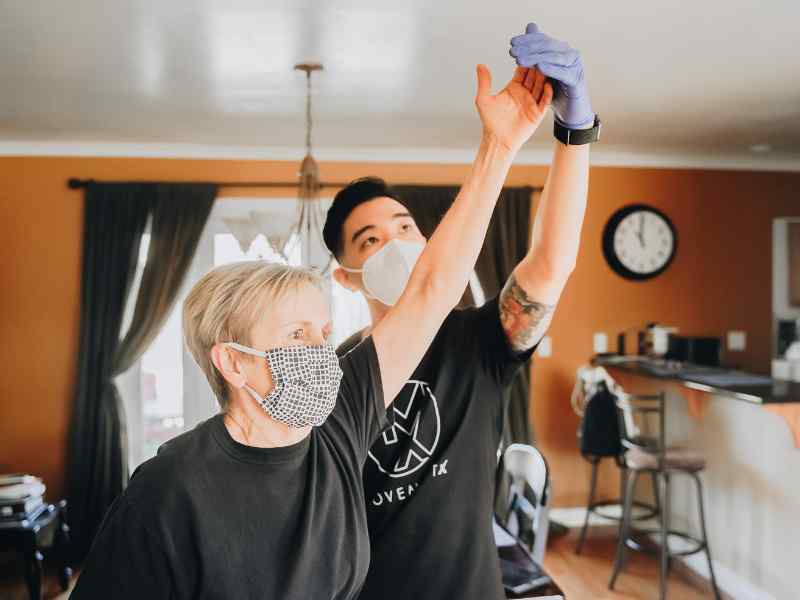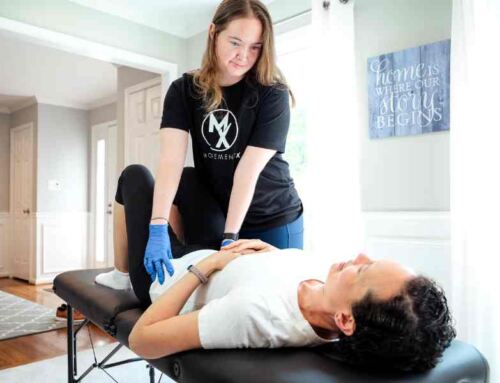As a mobile physical therapist in Costa Mesa, California, I often work hand-in-hand with home care and private nursing teams to help individuals with mobility challenges regain independence, safety, and quality of life in the comfort of their own homes.
Selecting the right home care agency is a vital decision, not just for the patient, but for their entire family.
A strong partnership between the home care team and the physical therapy team ensures a comprehensive and supportive experience that promotes emotional, mental and physical well-being for the patient and their loved ones.
First off, it is important to note the differences between in-home services. Here is a quick overview of the different types of services available, who they are for and how you work with them:
| Service Type | What It Provides | Who It’s For | How It’s Accessed |
| Home Care | Help with daily activities (bathing, dressing, meals, companionship) | Individuals needing non-medical support at home | Private hire, often not covered by insurance |
| Home Health | Skilled medical services (PT, OT, nursing, medication management, often from same team) | Patients recovering from illness, surgery, or injury needing short-term skilled care | Physician referral, often covered by insurance, typically set up after surgery by case manager |
| Mobile Concierge Care | Specialized medical services delivered on-demand (MovementX) | Patients who want convenience of in-home care, are home-bound or want to choose a specific, private provider | Direct Access, no referral needed to get started, sometimes reimbursed by insurance |
| Private Nursing Services | One-on-one skilled nursing care (IV therapy, complex medical needs) | Individuals needing long-term or specialized medical care | Private hire, sometimes insurance reimbursed, not covered by Medicare |

“One of the biggest misconceptions is that home care and home health are the same,” says Lori Kewalram, Owner of Brightstar Homecare Huntington Beach.
“Families often think Medicare-paid home HEALTH covers everything needed at home — but these services are typically short-term and medically focused. What they don’t realize is that home CARE — is what helps patients live safely and comfortably at home in between and after those skilled visits. This includes assistance with personal care, medication reminders, meal prep, mobility support, and more.”
Here’s what I encourage families to consider when choosing a home care team.
1. Minimum Hour Coverage
Not all home care agencies operate the same way. Some require a minimum number of hours per day or week for their services. Depending on your loved one’s needs, a lower minimum might provide more flexibility, while a higher minimum could guarantee a more consistent presence and deeper caregiver familiarity. It’s important to balance what the patient requires with what fits logistically and financially.
2. Credentialing and Training of Staff
When mobility issues are involved, the expertise of caregivers matters tremendously. Look for agencies that:
- Employ licensed or certified nursing assistants (CNAs) and/or home health aides (HHAs) with specialized training.
- Provide ongoing education for their staff.
- Screen caregivers thoroughly with background checks and professional references.
Physical therapists often collaborate with these caregivers, providing specific guidance on mobility strategies, exercise programs, transfer techniques, and fall prevention. Well-trained staff members make a huge difference in carrying out and reinforcing these therapeutic interventions safely and effectively.
3. Pricing and Transparency
Cost is always an important factor. Ask for clear pricing information upfront:
- Are services billed hourly or by shift?
- Are there weekend or holiday surcharges?
- Are equipment or supply costs extra?
Good agencies will provide detailed breakdowns without hidden fees. Some even offer packages or flexible pricing structures based on the level of care needed.

4. Availability and Scheduling Flexibility
Emergencies happen. Appointments get rescheduled. Patients’ needs evolve.
Choose a home care agency that offers flexible scheduling, reliable backup coverage, and responsive communication. It’s reassuring to know that if a primary caregiver is unavailable, a trained substitute can step in without compromising care quality.
5. Insurance and Payment Options
Not all home care services are covered by insurance, and policies can vary widely. Be sure to ask:
- Do they accept private insurance, Medicaid, Medicare, or long-term care insurance?
- Do they offer assistance navigating insurance claims or reimbursement?
- Are there payment plans available for out-of-pocket expenses?
A good agency will work with you to make the financial side as stress-free as possible.

How Physical Therapists and Home Care Teams Work Together
As a mobile physical therapist, my goal is not only to provide skilled therapeutic services but also help coordinate the patient’s broader care environment.
I collaborate with caregivers to ensure they understand how to:
- Assist safely with transfers, walking, and exercises.
- Monitor for changes in strength, balance, or function.
- Communicate effectively about any new concerns.
This teamwork promotes consistency, safety, and quicker recovery — all in the familiar setting of home.
Andrew Parker, Business Development Manager of Legacy Concierge, a partner company of MovementX that provides private nursing and companionship services in Southern California, states, “Working alongside partner therapy teams and observing their methods, allows for our care companions to become an extension of our partners, replicating therapies in between scheduled visits to promote quicker recovery for the patient.”
Effective collaboration and communication between care teams maximizes the value that patients receive from each team, as working together ensures a holistic care plan.
Partnering for a Holistic, Convenient Experience
At MovementX, we recognize how essential it is to have a trusted, integrated team when it comes to home-based care. That’s why we proudly partner with reputable home care companies, ensuring our patients and their families have easy access to both expert physical therapy services and reliable in-home assistance. Together, we make home care more convenient, more holistic, and more centered around your loved one’s unique needs.
If you or someone you care about is looking for support at home, reach out to us at MovementX. We’re here to help guide you through every step.
About the Author
Dr. John Huang is a physical therapist based in Orange County, CA. He is extensively trained in Movement System Impairments (MSI) and also treats orthopedic conditions, post-operative care, sports injuries, and neurological conditions. John Huang is certified as a Senior Fitness Specialist, Certified Nutrition Coach, Vestibular & Concussion Rehab Specialist, and more. Away from his practice, John is a professional DJ and loves to get people moving with the power of music.








